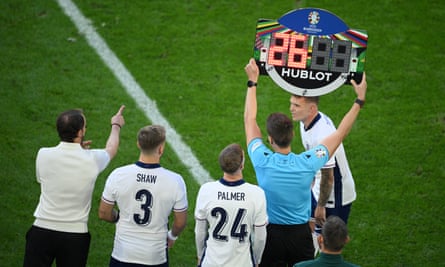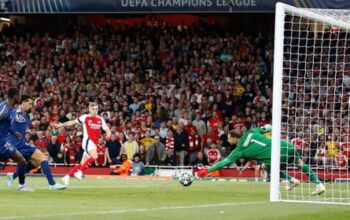Club football, at least at the elite level, is meticulously planned. Teams of analysts pore over the data, find the patterns, identify the signings who will fit the style and mitigate areas of weakness, highlight potential flaws in opponents. The richest teams can buy not only the best players but also the best coaches and the best analysts and, as a result, elite club football, in as much as a sport as capricious as football ever can be, is predictable.
International football is wild. You can’t buy to fill the gaps. Squads end up so unbalanced and incoherent that coaches may as well be working at Manchester United. Managers can prepare but time is limited. History is always present; cultures even now remain defined. Spain will pass. France will grind. Portugal will defer to Cristiano Ronaldo. England will retreat inexplicably in defence of a lead (and, at times, a draw). Coaches have limited time with players who are being trained week-to-week in a vast range of different styles.
Everything is, to an extent, about bodging something together game by game. For the Netherlands, that frequently means chucking on Wout Weghorst to clatter around and create some space. It might not work at elite club level but in tournaments he is a valuable alternative option.
That’s why the football part of international football is often a bit of a grind. It’s easier to organise a defence than an attack. A well-drilled low block is hard to overcome if you don’t have the rapid-fire automations of the club game to deploy. It often takes a moment of brilliance from an individual. Which is where, for once, England benefit. They have individuals capable of brilliance: they have Jude Bellingham and Bukayo Saka, who have saved them in the past two rounds, and they also have Phil Foden, Harry Kane, Cole Palmer and Eberechi Eze.
The temptation is to fall into the trap Argentina fell into between 2010 and 2018 and to pick too many of them. But Gareth Southgate is wise to that. He has said his model is Portugal in 2016 and France in 2018, teams who set out to keep it tight and wait for one of their extravagantly gifted forwards to do something. It might not thrill the world but if it works, who cares?
In Russia, France were fortunate that there were two games, against Argentina and Croatia, when it went wrong, which added a sheen of excitement; the quarter-final and semi-final victories over Uruguay and Belgium were what Didier Deschamps intended. In France, Portugal played abysmally, blundered through and suddenly woke up to find themselves facing Wales in a semi-final. That is the model.
For Southgate is a planner. To talk about individual genius, the greater randomness of international football, is not to say that preparation doesn’t have a role. It’s harder to create a coherent team, but that doesn’t mean a coherent team isn’t desirable. But even beyond that, the job of a national manager is to create the stage on which the brilliant individuals are most likely to perform their moments of individual brilliance.

Southgate’s capacity to respond to in-game situations has, rightly, been questioned but he excels at the background work. He is a good ambassador, which is half the job. Players do, with one or two exceptions, want to play for England. Nobody seems to regard it as a chore, which hasn’t always been the case. While he may be fortunate to have a gifted generation to coach, he is at least partly responsible for that generation thanks to his work with the England DNA programme and at under-21 level. He is perhaps rather better at the management side of football management than the football.
And yet at these Euros, the Southgate method has gone awry. That Kalvin Phillips might not be available to play alongside Declan Rice has been apparent for at least a year but England went into the tournament desperately chucking different players into the role in the hope that something might stick. The dearth of left-footers creating an imbalance was obvious when the squad was selected (still, surprisingly ruthless mild-mannered Englishmen winning anticlimactic victories while neglecting the left seems very fashionable these days). Abandoning the 4-3-3 of the World Cup to push Bellingham forward into a 4-2-3-1 created a bottleneck as he and Kane and Foden tried to occupy the same space.
after newsletter promotion
England are left doing it on the hoof. Trent Alexander-Arnold! No, Conor Gallagher! Errr, let’s try Kobbie Mainoo. A back four? Let’s give a back three a go, but not really a back three. Oh God, we’re 1-0 down with 15 minutes left. All of you creative lads, on! 3-1-5-1, whatever! Somebody, just do a moment of brilliance! Thanks, Bukayo.
If you’re the Dutch, how do you prepare for that? England could play almost any players in almost any shape. There’s an intoxicating wildness to it. It may be that the Dutch hammer a shapeless England in the semi-final, but it could be that the friction between Southgate’s instincts and off the cuff improvisation is what sparks implausible triumph.
Yet after all that, England beat Switzerland because their penalties were brilliant – and that is something Southgate has prepared meticulously. Perhaps they were lucky to get through the game but there was nothing fortuitous about the shootout from Jordan Pickford’s gamesmanship to the notes on his water bottle, from the buddy system to support the takers to the clinical nature of the penalties themselves.
Preparation, perhaps, creates the environment in which fortune can flourish.
Source: theguardian.com


